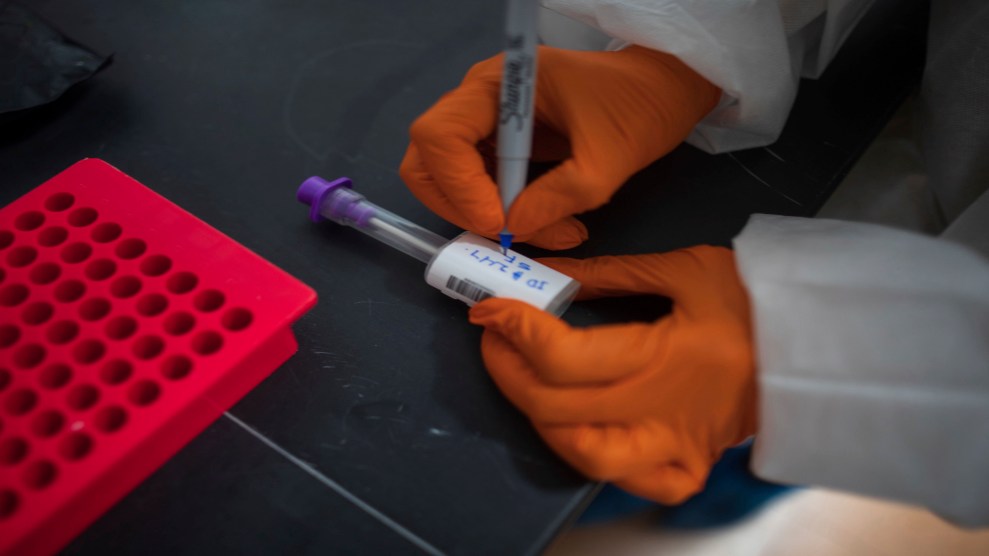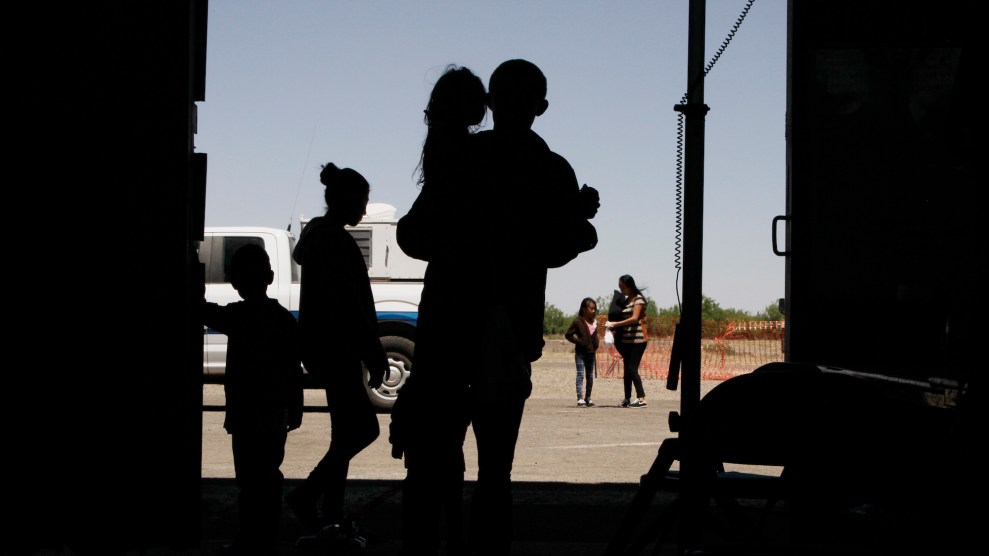
Teresa Canino Rivera/AP
Ever since the Trump administration scaled up DNA collection from migrants in federal custody, immigration officials have been pouring massive quantities of genetic data into the FBI’s national law enforcement database. New submissions to CODIS—short for the Combined DNA Index System—have grown so voluminous that the agency recently asked Congress for an additional $53 million in DNA funding, which would double the current budget.
The surge is sparking concerns among civil liberties advocates. And, they point out, immigrants aren’t the only people whose privacy could be threatened by increased government collection of genetic information.
“This kind of massive expansion just gets us ever closer to a universal DNA database,” says Vera Eidelman, a staff attorney with the American Civil Liberties Union focusing on genetic privacy. It’s “a trend that we often see with surveillance mechanisms, particularly as they get cheaper and faster and easier to use.”
According to the FBI’s 2024 budget proposal, the number of profiles uploaded to CODIS over the last year was 10 times higher than usual, adding over 1 million samples to its existing collection of 21 million. A major source of this growth, the bureau said, was DNA amassed by immigration enforcement.
The budget increase “will allow the FBI to process the rapidly increasing number of DNA samples collected by the US Department of Homeland Security,” the bureau wrote. In a statement to Congress, FBI director Christopher Wray predicted that the end of Title 42—an emergency health measure invoked during the pandemic to turn away asylum applicants, which lapsed in May—would cause the number of new genetic samples to spike even further, to 1.4 million per year.
These numbers show just how dramatically genetic surveillance has intensified in recent years, after the Trump administration extended it to cover hundreds of thousands of migrants who were previously exempt. Since 2020, immigration authorities have taken cheek swabs from vastly more people in their custody, including asylum seekers and children as young as 14. The large majority of these migrants have no serious criminal record, but their genetic information is being funneled into CODIS—a national database whose primary purpose is to help law enforcement solve crimes.
Under the DNA Fingerprint Act of 2005, the federal government is authorized to take DNA from people convicted or arrested for certain offenses, as well as from foreigners who are “detained under the authority of the United States.” When the Obama administration first implemented this legislation, however, it allowed then-DHS Secretary Janet Napolitano to exempt migrants who hadn’t been charged with a crime or who were already awaiting deportation. This accounted for some 800,000 people, Napolitano told the Department of Justice. Trying to take genetic samples from all of them “would severely strain the resources of the agency.”
That changed in 2020, when the Trump DOJ took away Homeland Security’s power to waive DNA collection for some migrants. The move came after a whistleblower complaint from within DHS alleged that, by exempting hundreds of thousands of detainees from DNA collection, the agency was shirking its duty and allowing dangerous migrants to walk free.
“The agency’s noncompliance with the law has allowed subjects subsequently accused of violent crimes, including homicide and sexual assault, to elude detection even when detained multiple times by CBP or Immigration and Customs Enforcement,” said a letter from special counsel Henry J. Kerner presenting the complaints. “This is an unacceptable dereliction of the agency’s law enforcement mandate.”
By that point, DNA technology had also become much more advanced than it was when the law was first implemented a decade earlier. In the summer of 2019, ICE piloted the use of “rapid DNA” tools along the southwestern border, taking migrants’ cheek swabs to verify family relationships in about two hours. Those samples weren’t taken for CODIS, but it was a proof-of-concept indicating that immigration agencies could obtain genetic samples at scale. According to Homeland Security officials, this program was one of the driving forces behind the Justice Department’s decision to revoke DHS’s power to exempt groups of migrants from DNA collection. The rule change was proposed just a few months after the pilot started, and it went into effect the following year.
Since then, migrants have been required to hand over their genetic information in detention facilities across the country. According to reporting by BuzzFeed, asylum seekers in Texas were instructed to swab the inside of their mouths and give the sample to a CBP officer, who would place it in an envelope to be processed for CODIS. Many migrants don’t know what the swab is for, the immigrant rights group Al Otro Lado told BuzzFeed, adding that one officer said to detainees it was being collected so that “in case they do anything bad, then the government will be able to find them.”
But some advocates argue that the Trump administration’s conflation of migrants with crime was used, at least in part, as a strategy to broaden the government’s surveillance powers.
“There’s no connection between the people who they’re collecting from and any sort of criminal offense,” says Saira Hussain, a civil liberties attorney with the Electronic Frontier Foundation. “It’s just another way of trying to grab more and more DNA.”
The Trump administration justified the mass DNA collection by arguing that most people in immigration custody were basically criminals already. The “practical difference between criminal arrestees and immigration detainees” is “largely artificial,” wrote the DOJ when proposing the rule change, since most migrants are “held on the basis of conduct that is itself criminal.” That’s likely a reference to illegal entry, or the act of crossing the border without documentation, which, for a first-time offender, is a misdemeanor. But almost no other nonviolent misdemeanor qualifies someone for DNA collection—either at the federal level or in the vast majority of states. The DOJ also didn’t explain why cheek swabs were needed for asylum applicants, whose right to seek protection is granted by federal law.
With so many genetic profiles stored in the national database, Eidelman worries that the information could be ripe for misuse.
“DNA is deeply personal, deeply sensitive—it reveals potentially very private information about an individual,” she says, ranging from “adoption or unknown siblings to their propensity for pretty serious and sensitive medical conditions.” And “it reveals that information potentially not just about the individual, but also their family members.”
While the Biden administration has halted some of its predecessor’s attempts to heighten surveillance of migrants, it hasn’t rolled back the expansion of CODIS. In May, the administration announced that the Border Patrol would stop using genetic testing to verify family relationships but emphasized that the collection of migrants’ DNA for CODIS “should continue uninterrupted.”
















